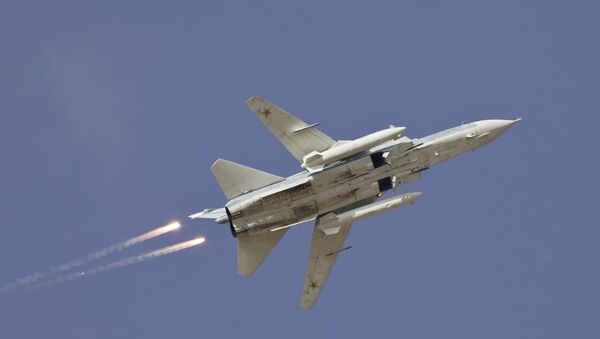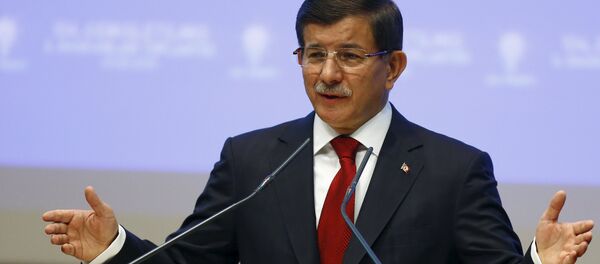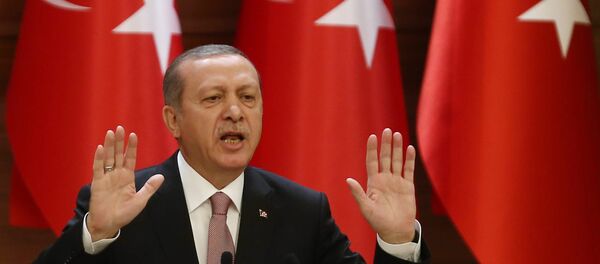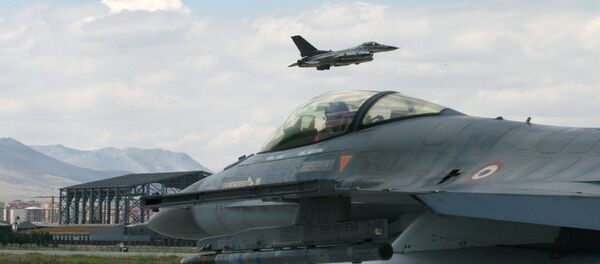The journalist pointed to the commentary of Lt. Gen. Tom McInerney, former US Air Force Vice Chief of Staff, who bluntly told Fox News that the attack was a "very bad mistake" and a sign of "poor judgment" on Turkey's part.
McInerney, Kivanc noted, went so far as to call the attack an "aggressive" act, adding that the Russian plane had not made "any maneuvers to attack [Turkish] territory." Having himself served as a NORAD commander in Alaska, McInerney noted that he could never imagine US planes responding to a violation of US airspace by shooting down the plane as the first response. Ultimately, the former military commander suggested that "this could have been a deliberate provocation by President Erdogan."
Praising McInerney for his professionalism, and his ability to explain the situation in a simple and clear manner, Kivanc contrasted this with some of the rhetoric found in the Turkish press over the incident. Many Turkish commentators, he noted, have focused all their attention on the fact that the militants the Russian planes were bombing in the region weren't Daesh (Islamic State).
"All this is well and good," the columnist noted, "but did anyone ever claim that the Russians were bombing ISIL here? No, they didn't. So why the commentary on ISIL's absence? It is well-known that in this region, where the Syrian Army is attempting to advance, under the cover of Russian air support, there is Al-Qaeda (Al-Nusra Front), Ahrar al-Sham, and other armed groups, with whom Turkey has rather close contacts. [Moreover,] according to Russian Foreign Minister Sergei Lavrov, the area contains terrorist infrastructure, including arms and ammunition depots and command centers."
Moving on to Turkish authorities' claims that the Russian plane had violated Turkish airspace, for 17 seconds, and had been warned "ten times in five minutes," the journalist noted that several questions could not give him piece of mind over Ankara's claims.
First of all, Kivanc noted, "we are talking about a military plane, capable of increasing to speeds of a thousand kilometers or more per hour. If the aircraft was first warned over the space of 'five minutes', at what distance [from the border] did the warnings start? Were they understandable? Was the plane flying very slowly?"
The journalist pointed out that "judging by the fact that in a matter of 17 seconds the plane had [allegedly] flown 1.8 km into Turkish territory, I recalled the opinion of German pilots flying Tornado fighter bombers. In a commentary for Der Spiegel, one of them suggested, based on the trajectory pictured in the diagram [released by Turkish authorities], that the Russian plane could have been in Turkish territory for 10-15 seconds. In other words, we would not even have had the time to tell it to 'shoo', before it was gone!"
Furthermore, Kivanc recalled, "there are ways to address [airspace violations] before shooting a plane down. These include, for example, accompanying the plane until it exits from your airspace. This idea, for some reason, was ignored, instead moving right away to the last possible option."
In fact, the journalist emphasized that the plane was allegedly in Turkish airspace "for such a short amount of time that not only was it not necessary to shoot it down –it wasn't necessary to do anything with it."
Poring over all the details of the attack, both in Turkish and Western media, the journalist suggested that the main issue, in his view, was that of the "huge disparity" between the alleged Russian violation, and the Turkish response, all of which seemed to demonstrate that authorities in Ankara may have been looking for just such a provocation.
Noting that the Turkish letter to the UN had declared that the Su-24 was shot down "in Turkish airspace," Kivanc pointed out that the map released by Turkey's own Ministry of Defense "refutes such suggestions."
All in all, Kivanc suggested, "the incident does not look like a natural reaction of a state whose airspace has been violated. One gets the impression that the decision was made in advance, and was itself extreme in character, deliberately searching for a suitable situation." This, the journalist notes, is exactly how Russia characterizes it, with Foreign Minister Lavrov calling the attack a "pre-planned provocation."
Noting that Turkish Prime Minister Ahmet Davutoglu had basically confirmed the political nature of the decision, when he noted following the attack that he had "personally given the instructions to the General Staff," to deal with violations in a harsh manner, Kivanc added that "the fact that immediately following the incident, Ankara rushed to NATO, instead of establishing direct contact with Moscow, leads one to agree with the skeptical approach of the American Lieutenant General."








